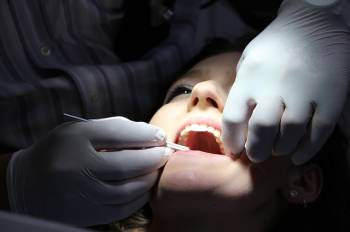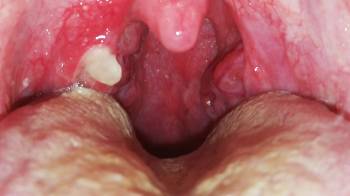What Causes Bad Breath?
Hits: 3636
Persistent bad breath, or Halitosis, can be caused by a variety of conditions. People may tell you about your breath, which can lead to some embarrasing situations, or you may notice a persistently dry mouth, unpleasant or sour taste in the mouth, or a coating on the tongue.
Here are common causes of bad breath.
Poor Oral Hygiene
 Poor oral hygiene is the most common cause of bad breath. If you don't floss and brush your teeth regularly, food that gets trapped between your teeth gets broken down by bacteria. These bacteria are responsible for tooth decay and gum disease, but can also produce unpleasant smelling gasses, resulting in bad breath.
Poor oral hygiene is the most common cause of bad breath. If you don't floss and brush your teeth regularly, food that gets trapped between your teeth gets broken down by bacteria. These bacteria are responsible for tooth decay and gum disease, but can also produce unpleasant smelling gasses, resulting in bad breath.
Bacteria can also live on the rough surfaces of your tongue. Cleaning your tongue regularly can help control bad breath.
Food particles not properly cleaned from appliances such as dentures or braces can rot and cause bad odours. Loose-fitting dentures may cause sores or infections in the mouth, which can also cause bad breath.
Have your dentist give you a check-up. If your dentist suspects a more serious condition is causing your bad breath, he or she may refer you to a physician for further assessment.
Acid Reflux
 Acid from the stomach and flow backwards, up the oesophagus, if the valve between them is leaky. This condition is known as gastro-oesophageal reflux disease (GERD) and can give your breath a sour smell and bring up bits of food or acid into your mouth.
Acid from the stomach and flow backwards, up the oesophagus, if the valve between them is leaky. This condition is known as gastro-oesophageal reflux disease (GERD) and can give your breath a sour smell and bring up bits of food or acid into your mouth.
The acid also can damage your throat and mouth, and that can make a breeding ground for more smelly bacteria.
H. Pylori Infections
H. Pylori is a bacteria often found in the stomach, and has been linked to stomach cancer and gastric ulcers. It has recently been found by scientists to also live in the mouth. Its presence in the mouth is associated with periodontal disease (which causes bad breath). It can also contribute to bad breath by causing reflux symptoms and gastric bloatedness. Your doctor can test you for it, for instance, via gastroscopy or via a Urea Breath Test. Many of these symptoms go away when the bacteria is killed with antibiotics.
Respiratory Infections
 Colds, coughs, and sinus infections can send mucus filled with bacteria through your nose and mouth, causing bad breath. Mouth breathing due to a blocked nose, can cause dryness of the mouth.
Colds, coughs, and sinus infections can send mucus filled with bacteria through your nose and mouth, causing bad breath. Mouth breathing due to a blocked nose, can cause dryness of the mouth.
Common medication taken for colds such as anti-histamines, can also cause drying of the mouth. Dry mouths have increased bacteria build up, causing bad breath.
Dry Mouth
Saliva is necessary to moisten the mouth, neutralize acids produced by plaque, and wash away food particles and dead cells that accumulate. If not removed, these cells decompose and can cause bad breath.
A lack of saliva can cause more bacteria than normal to build up in your mouth. It can also cause a change in the types of bacteria residing in the mouth.
Dehydration
When you are dehydrated, you may not make enough saliva, causing drying of the mouth. As explained above, a dry mouth tends to cause more bacteria build-up, leading to bad breath.
Certain Medication
 Some medicines cause bad breath because they dry out your mouth. Common examples of these would be over-the-counter anti-histamines, used for itch or colds. Other drugs, like nitrates, used in the treatment of ischaemic heart disease, chemotherapy for cancer, and some sleep aids -- release chemicals that can make your breath smell when they break down in your body.
Some medicines cause bad breath because they dry out your mouth. Common examples of these would be over-the-counter anti-histamines, used for itch or colds. Other drugs, like nitrates, used in the treatment of ischaemic heart disease, chemotherapy for cancer, and some sleep aids -- release chemicals that can make your breath smell when they break down in your body.
Taking in excessive amounts of certain vitamins can also cause bad breath.
Tonsil Stones
 Your tonsils are made up of crevices, tunnels, and pits, which can sometimes trap debris, such as mucus, saliva, dead cells and food. Bacteria and fungi feed on this debris and cause your breath to smell.
Your tonsils are made up of crevices, tunnels, and pits, which can sometimes trap debris, such as mucus, saliva, dead cells and food. Bacteria and fungi feed on this debris and cause your breath to smell.
Potential causes of tonsil stones include having poor oral hygiene, large tonsils, chronic tonsillitis and sinus infections. Other than causing bad breath, larger tonsil stones can cause a sore throat and difficulty swallowing.
If you are prone to getting tonsil stones, there are fortunately simple things you can do to prevent them. These including practicing good oral hygiene, gargling regularly with salt water, stopping smoking, and ensuring you drink plenty of fluids to stay hydrated. Talk to your doctor if you get them often. Large, troublesome stones may need to be removed.
Diabetes
 If you have diabetes, bad breath may 2 main causes: periodontal disease and high levels of ketones in the blood.
If you have diabetes, bad breath may 2 main causes: periodontal disease and high levels of ketones in the blood.
Periodontal diseases, also called gum diseases, include gingivitis (gum inflammation) and periodontitis (gum infection). Diabetes damages blood vessles over time, thus reducing blood flow throughout the body, including the gums. When your gums and teeth do not receive a proper supply of blood, they become more prone to infections. High sugar levels in diabetes promote bacteria growth and also makes it harder for the gums to heal.
With reduced insulin production in diabetes, cells which do not receive the glucose they require for fuel, swith to burning fat instead. Burning fat instead of sugar produces ketones, which build up in your blood and urine. Ketones cause a sweet, fruity odour in the breath.
When ketones rise to unsafe levels, you are at risk of a dangerous condition called diabetic ketoacidosis (DKA).
Liver Failure
Liver failure can cause a sweet, musty and occasionally faecal smell, known as "fetor hepaticus". It occurs because of the build up of certain substances such as dimethyl sulfide, acetone, 2-butanone and 2-pentanone. You may also have other symptoms, including jaundice -- when your skin and the whites of your eyes turn yellow, because of the buildup of bilirubin in the blood.
Kidney Failure
Kidney failure increases the level of urea in the blood. This urea is broken down into ammonia, which becomes, among other things, noticeable as a "fishy breath". This is most common in the last stages of kidney failure, known as end-stage renal failure (ESRF). People with ESRF will generally require dialysis or a kidney transplant.
